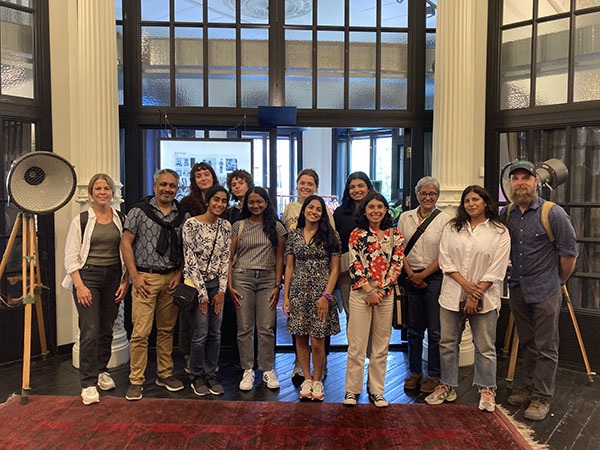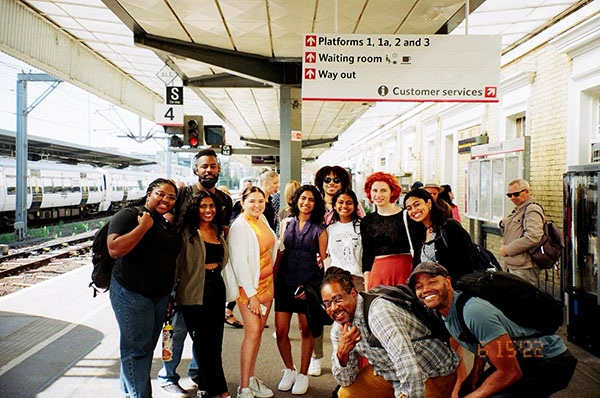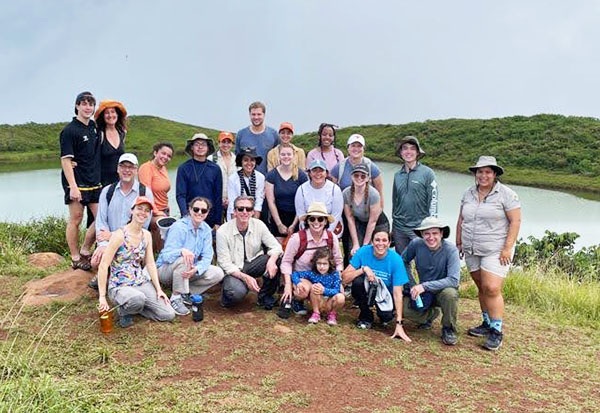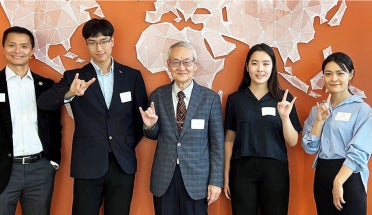
Inspired Cohorts Return from President’s Award Journeys with Broadened Perspectives
- Aug 30, 2022
- Global Initiatives
- by Alex Briseño
From talking with garment workers on factory floors in India to building solar panels in the Galápagos Islands to addressing American and British academic racism, the President’s Award for Global Learning continues to provide perspective-changing experiences to students and faculty from The University of Texas at Austin.
“I can say this with 100 percent confidence: This is one of the most impactful experiences of my entire life. ... If you want to go out of the country and are looking for a fun way to do it while also conducting research, [this program] is the perfect opportunity for you—besides the fact that it didn’t cost a thing.”
As the signature program of the university's International Board of Advisors, the President’s Award annually contributes funding and resources to students and faculty, who form interdisciplinary teams to develop and implement research programs around the world. With their travel fully funded, in addition to an honorarium for faculty and an implementation budget, awardees are tasked with identifying issues in various regions of the world and proposing solutions on a global scale through program-based collaborations alongside their international partners.
This year’s three teams, representing more than a dozen colleges and disciplines, focused their programs on the following topics: protecting the fragile ecosystem of the Galápagos Islands; exploring and addressing racism within academia in the United Kingdom and United States; and discovering how fashion companies strive to achieve ecological sustainability and social justice across production nodes in Sweden and India.
For Jayelon Evans, a U.S. Navy veteran and senior studying kinesiology in the College of Education, traveling to London was already on his bucket list. The President’s Award helped pave the route to make that happen, providing him with the unique opportunity to lead conversations on race at some of the most prestigious institutions in the U.K.
“I can say this with 100 percent confidence: This is one of the most impactful experiences of my entire life,” said Evans. “Any student who is considering [the President’s Award] needs to apply. Just apply! If you haven’t been out of the country, or if you want to go out of the country and are looking for a fun way to do it while also conducting research, [this program] is the perfect opportunity for you—besides the fact that it didn’t cost a thing.”
Texas Global is proud to amplify the stories of three exceptional UT Austin students, one from each of the 2021-2022 teams of the President’s Award for Global Learning. They have all returned to campus seeing through a new lens, one trained not only on their studies but also on the various corners of the world that hosted them and benefited from their research.
- India and Sweden: Redefining Sustainability in Fashion
-

For Neha Donthineni, a second-year biology and Plan II double major, the interdisciplinary offerings were what initially attracted her to the President’s Award.
But it was her cohort’s program—addressing issues such as ecological sustainability and social justice within the fashion industry—that brought her back to India, the country she had called home during summer visits with her grandparents.
“With our particular project, seeing the possibilities and applications of different disciplines was so inspiring to me,” said Donthineni. “I thrive on seeing where different disciplines intersect. This project focused on fashion, but it also touched business, marketing, sustainability and health care for workers.”
This faculty-led program, titled Cotton Threads: Fabricating Ethical Production and Consumption in the Garment Industry, provided students with an immersive, hands-on experience through coursework, field visits and independent research in Texas, Sweden and India.
The big picture, Donthineni explains, is that sustainability, although it has become a popular buzzword, is nearly impossible to define within the fashion industry, let alone achieve.
“Although there is a lack of eye-to-eye on a definition of sustainability, our project is focusing on finding that middle ground and exploring how we can talk about it in a way that allows different nodes of the business and supply chain—the laborers, manufactures, producers, businesses, consumers—to work together and move forward to make the whole fashion industry more sustainable.”
The cohort's research in Sweden included a partnership with Nudie Jeans, an eco-friendly denim company in Gothenburg that prides itself on striving to become the most sustainable denim brand in the world.
“They really opened up their business model to us so that we could understand how they were going about working with the laborers and partners in India,” said Donthineni. “We met with their sustainability manager, and we also got to listen to presentations from the product managers and co-founder, just to get an idea of how the company could make their information more transparent in terms of the company’s sourcing and how they want to communicate with consumers.”
The team also worked with Nudie Jeans’ suppliers and academic collaborators in Bangalore, India, where they visited garment factories.
“During those visits, we met with different garment workers,” said Donthineni. “We heard their life stories, how they got into garment work and how they feel about it: whether they want to keep doing it, whether they actually care about sustainability and what they were making, or if it was just a means to earn for their family.”
While India feels familiar to her, Donthineni expressed her gratitude for this unique opportunity to hear from garment workers and gain new, additional perspectives on a country she grew up in.
“Coming from a biology perspective with experience in STEM research, it’s very methodical. You have a hypothesis, and you know exactly how the experiment should go. Coming into this, it was all about hearing these life stories and getting to the heart of what they care about,” said Donthineni.
Between seeing firsthand the amount of work that goes into crafting each piece of clothing in garment factories and witnessing the lack of transparency that companies display regarding sustainability, Donthineni says this experience is forcing her to also reconsider aspects of the fashion industry that she never questioned previously.
“I just don't know how to buy clothes anymore," she mused. "A piece of clothing that is sustainable or ethically sourced might cost $40 for a T-shirt, and that’s certainly out of the price point for a lot of consumers."
The experience further framed Donthineni's past and present in sharp relief: "Coming from an immigrant background where penny-pinching is so normalized, it’s difficult to mesh these two worlds together. This ethically sourced shirt is really, really expensive, but I also can’t buy a $5 T-shirt anymore.”
With the knowledge gained from this research project, participants now have the opportunity to integrate new skills and test the sustainability of Nudie Jeans’ business model in Texas, the largest grower of cotton in the U.S.
- United Kingdom: Addressing Racism Within U.K. and U.S. Academia
-

It was through a Spring 2021 May Term that Jayelon Evans was introduced to Dr. Richard J. Reddick, a renowned professor in UT Austin’s Department of Educational Leadership and Policy and the associate dean for Equity, Community Engagement and Outreach in the College of Education.
The May Term had initially included a trip to the U.K. in the spring of 2021, which was canceled due to COVID-19. Evans recalls shortly thereafter running into Reddick on campus, who shared with him another opportunity in the U.K.
This time it was a research program through the President’s Award for Global Learning that aimed to bring together perspectives of faculty, staff and students from diverse higher education environments to explore and validate the viewpoints, communities and experiences of people of color navigating academic spaces.
With nine years of service in the U.S. Navy as a missile technician on the USS Maine SSBN-741, a ballistic missile submarine, Evans says he was already deeply interested in not just how the U.S. operates, but how the whole world does.
“I've always been interested in history—how people perceive the U.S. and how the U.S. perceives other people,” said Evans. “Getting the opportunity to go and do this research project was awesome because it fulfilled a lot of things that I’ve wanted to do in my life.”
The program, titled Addressing an Era of Transatlantic Racial Reckoning: Imagining Anti-Racist Academic Worlds in the United Kingdom and the United States of America, featured one team focused on creating a short film and another conducting a study on how people are perceived in the U.K. based on the context of their hair. Evans’ group worked on hosting a research panel.
The program features two visits to the U.K.: a two-week trip in July 2022 followed by another weeklong stay, coming up in January 2023.
“The goal of this first trip to the U.K. was basically to try to make connections,” said Evans. “Me and my partner, Haley Leal, worked on a research panel, which brought together faculty and students from multiple U.K. universities to talk about their experience as ethnic minority students.”
The team visited the University of Oxford, the University of West London, the University of Cambridge, Birmingham University and the Imperial College London, Hammersmith campus, where the panel was hosted.
The panel consisted of a professor from Oxford University, an associate professor from the University of West London, a graduate assistant and three students from the various listed universities.
“They were postgrad students, so to be on their level and hear what they had to say really resonated with us,” said Evans. “Being in this space with this many individuals that have gone on to do excellent and progressive work was just mind-boggling. It's hard to get that many people in a room together at one time. Being invited to that environment was a privilege of a lifetime.”
To guide the conversation, the students were presented with a list of questions such as, “In what way has your racial and cultural identity played a role in your academic success and/or affiliations?” and "What efforts would you like to see made within your campus to further promote diversity and inclusion?”
“The discussion can be summed up very simply,” said Evans of the resulting responses. “The people in charge of these universities are not representative of the student bodies, essentially. The people in charge don't really listen to what ethnic minorities are saying. I don't want to speak for them and say that they don't care; it's just not high on their priority list.”
Students of color both from the U.S. and the U.K. noted that, throughout their academic careers, the overwhelming majority of their professors have been white.
“That goes to show what the professional education scene is in other parts of the world,” said Evans. “It was super-enlightening to us because we've honestly lived very similar lives, 14,000 miles apart.”
The group looks forward to its second trip to the U.K., in 2023. In the meantime, Evans’ team will work on hosting a panel at UT Austin and potentially bringing in some of the students they met in the U.K. The panel will feature similarly incisive questions as those asked in the original survey, with hopes of attracting the attendance of university leadership and media.
“That's the goal of what we're trying to do,” said Evans. "We want to talk with university leaders and see what we can do to make the experience of higher education more beneficial to ethnic minority students."
- Ecuador: Building for a Sustainable Future for the Galápagos Islands
-

For Juan David Ledesma, a fifth-year architecture student from Quito, Ecuador, the President’s Award for Global Learning represented not just a chance to gain a hands-on, rigorous research experience but also an opportunity to make an impact on the place he calls home.
Based in the Galápagos Islands, the Do-No-Harm, Do-More-Good: Building for Sustainability in the Galápagos program focused on researching innovative and implementable solutions to sustainably support the area’s fragile ecosystem, which is threatened by a recent surge in land-based tourism.
In other words, the decision to pursue this opportunity was a no-brainer for Ledesma.
“The idea of helping and giving back to my country was amazing to me, so I jumped at the opportunity the moment the Galápagos Islands was mentioned,” said Ledesma. “It felt great to have the support of the university. It was great to work with such smart people who were interested in helping the community.”
The team of 12 students broke into three groups that focused on different sustainable behaviors and solutions, with Ledesma’s team focusing on energy and the viability of solar energy on the island.
Ledesma explains that the majority of the energy used in the Galápagos Islands is produced through the burning of diesel fuels in generators. Not only does the practice produce several million tons of carbon dioxide emissions per year, but the transportation process is also dangerous.
In 2001, 150,000 gallons of diesel bunker fuel spilled from a tanker ship that was grounded on the island of San Cristobal. The environmental impact was devastating. A follow-up study revealed that more than 60 percent of the iguanas on neighboring Sante Fe island died by the end of that year.
“This is a very fragile environment, so solar power is a great way for the islands to produce energy and thus become energy-independent from the mainland,” he said. “When COVID hit, for example, the boats didn't come to the Galápagos Islands as much, and this heavily impacted us. Giving the islands resource independence from the mainland is an achievable goal.”
The group's first task was to conduct research on solar panels, investigating aspects such as functionality, costs and installation. After arriving in the Galápagos Islands, Ledesma’s team surveyed 50 people on the streets about their knowledge of solar power, the use of diesel and whether they would be open to switching over to solar power.
“The people there were not as conscious of solar panels as we thought they would be. That's one thing that surprised us,” said Ledesma. “But also, the people wanted to help the environment. They all said everyone recycles and remains focused on the environment, but they didn’t really know how to help, energy-wise.”
The program featured two separate visits to the archipelago, the first of which covered their survey and visits with local electricians. They learned that the resources for implementing solar panels exist right there on the island, but this information isn’t presented to the public in a way that is easily digestible.
The second visit revolved around presenting the information they gathered and identifying an approach that paves the way for the wide use of solar energy.
“After concluding our research, we landed on ‘It’s possible,’ ” said Ledesma.
He added, “Our main focus was to gather all this information, put it together and make it public. So, the next time someone thinks ‘Oh, well, I was thinking about maybe switching to solar power,’ they don't have to ask a guy who knows another guy who knows the right person. Instead, we can provide information on down payments, logistics and point them toward the professionals who can install solar panels.”
This project was an especially personal one for Ledesma because, beyond returning to his home country of Ecuador, he noted that his nephew currently resides on the islands.
“This is a way to ensure that my family’s future is sustainable and secure,” he said.
That's also why he was overwhelmed by the number of people willing to help, both from UT Austin and Ecuador. And because he was so motivated by the idea of giving back to his country, Ledesma said, there wasn’t a single moment of the project that felt like work or class.
“The idea of being able to help my home country, my family, and people on the island is what drove me throughout the whole process. I feel like I was smiling the entire trip,” said Ledesma. “Everyone there from UT Austin was really giving their best efforts. It made me really happy to see people who have nothing to do with Ecuador pouring their souls into these projects to help the community.”
For more information about the award, past projects and participants, and opportunities to apply, visit the President's Award for Global Learning website.



